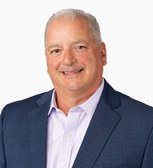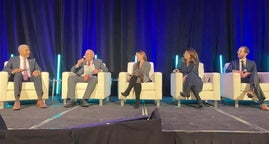Fallon Health dropping out of commercial health insurance market
 Photo | Grant Welker
Fallon Health's Worcester headquarters
Photo | Grant Welker
Fallon Health's Worcester headquarters
Fallon Health will no longer provide commercial health insurance coverage, the Worcester company said Wednesday, instead focusing on government programs including Medicare and Medicaid.
Fallon, which has roughly 260,000 members, said it hopes to become the region's leading provider of government healthcare programs, a decision it said is consistent with its mission that includes servicing high-needs individuals. It was the state's first health plan to cover Medicaid recipients in 1979, and the first to operate an inclusive program for the elderly in 1995.
"It was a decision that we made that's very consistent with our history," Fallon CEO Richard Burke said in an interview.
[Related: Fallon Health reports strong 2020]
Fallon, a nonprofit, was already increasing its share of members on Medicare, Medicaid and other government health programs. Between 2017 and 2020, members of Fallon’s government-sponsored programs grew from 31% to 57% of membership, Fallon said. Those programs also provide Fallon with a disproportionate share of its revenue at 84% of all such income.
The shift will begin Thursday. Existing commercial members will be able to stay on for up to 18 months.
Fallon has regularly been a distant fourth among the state's health insurance plans by revenue and membership. Blue Cross Blue Shield of Massachusetts is the largest, followed by Harvard Pilgrim Health Care and Tufts Health Plan, which merged effective at the start of 2021. Fallon didn't cite that as a factor in moving away from commercial insurance, and Burke said Fallon expects Medicaid and Medicare memberships to continue rising.
[Related: Mass. healthcare spending rose 4.3% in 2019]
The long-considered decision, Burke said, was centered around focusing on an area where Fallon had strength and where the need was great. The coronavirus pandemic demonstrated how great health disparities can be between different segments of the public, he said.
"That's really what drove the decision," Burke said.
Fallon also sees a related opportunity to expand its Summit ElderCare program, what's known as a PACE, or program for the all-inclusive care of the elderly, offering. Fallon already has six Summit sites and sees an opportunity for more. Only 11% of the population that's eligible for PACE is now enrolled, Burke said.
[Related: Fallon joins with health tech firm on care management platform]
Fallon, one of Worcester's largest employers, also doesn't plan to fade away from community involvement because of its turn toward a more niche market. The company is a major sponsor at Polar Park, the baseball stadium that's due to begin hosting Worcester Red Sox games May 11.
Fallon's change in focus comes as the federal government expands eligibility and incentives for uninsured residents as part of the Affordable Care Act. Massachusetts already has the nation's lowest uninsured rate.













0 Comments